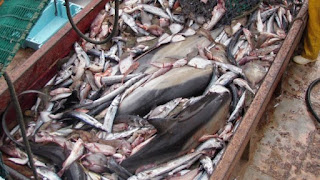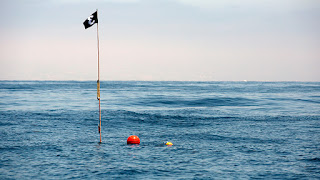1. Fighting Climate Change? We’re Not Even Landing a Punch


Following major world conferences on climate change (1988, 1997, 2016), carbon emissions have actually gone up--from 30 billion tons in 1988 to 50 billions tons in 2016. The earth's average temperature has risen from half a degree to 1.1 degrees Celsius over that of the last two decades of the 19th century. The New York Times suggests that leaders are ignoring the climate change numbers and that current approaches to reining in emissions are not working.
---------------------------------------------------
---------------------------------------------------
3. Vancouver Aquarium Will No Longer Keep Cetaceans in Captivity
2. New Zealand Debates Access to Bycatch Footage
Bycatch of unintended species, like sea birds, dolphins, penguins and sea lions, is a major problem in fisheries around the world. New Zealand proposes putting cameras on fishing boats. But that move is controversial because fisheries don’t want the footage shown to the public. Existing rules require fishing companies to report their own bycatch and sometimes have observers onboard. It’s probable that those reporting their own bycatch are grossly underestimating the amount and species they catch.
Read More... ---------------------------------------------------
Bowing to public pressure, the Vancouver Aquarium has announced that it will no longer keep whales and dolphins in captivity. Last May the Vancouver park board voted to ban the aquarium from keeping any new cetaceans in captivity. The Vancouver Aquarium is still fighting that ban in court because they want to use one of their facilities as a rehabilitation center for injured cetaceans.
Read More... ---------------------------------------------------
4. Increasing Number of West Coast Fishermen Use Innovative Gear to Reduce Bycatch
Swordfish are caught off the West Coast of the United States primarily with drift gillnets. But an increasing number of fishermen have applied for permits to use deep-set buoy gear. This method "is far less destructive to whales, sea turtles, and porpoises than drift gillnets," says Pew Charitable Trusts. Buoy gear makes 90 percent of the catch marketable, compared to just 40 percent of gillnet catch.
Read More... 5. Scientists Using Bioluminescent Deep Sea Animals to Fight Cancer
Researchers are using enzymes from glowing deep sea creatures to test the effectiveness of immunotherapy cancer treatments. “But threats to the ocean from climate change and exploitation threaten marine life and its medicinal potential.” Currently cancer researchers use radioactive chromium to trace cancer cells, which has a number of problems. “The enzymes that cause sea life to glow, called luciferases, have been used in a number of other applications for years, but Dr. Preet M. Chaudhary of the University of Southern California says this is the first time they have been used as an immunotherapy test, or assay.”
Read More...
---------------------------------------------------
A new study from the University of California at Irvine has found that marine vegetation in shallow coastal ecosystems can help mitigate the effects of ocean acidification. The marine plants reduce acidity in their surrounding environment through photosynthesis. That could mean good news for shellfish. The shellfish industry is being hit hard from acidification, which weakens the shells of shellfish. The industry “contributes over $1 billion annually to the U.S. economy while providing more than 100,000 jobs.”
---------------------------------------------------
Be sure to "LIKE" http://facebook.com/SeaSave to ensure our "Week in Review" is delivered to your newsfeed every Friday.
Sea Save Foundation is committed to raising awareness of marine conservation. The Week in Review is a team effort produced by the Sea Save staff to provide a weekly summary of the latest in marine research, policy, and news.




